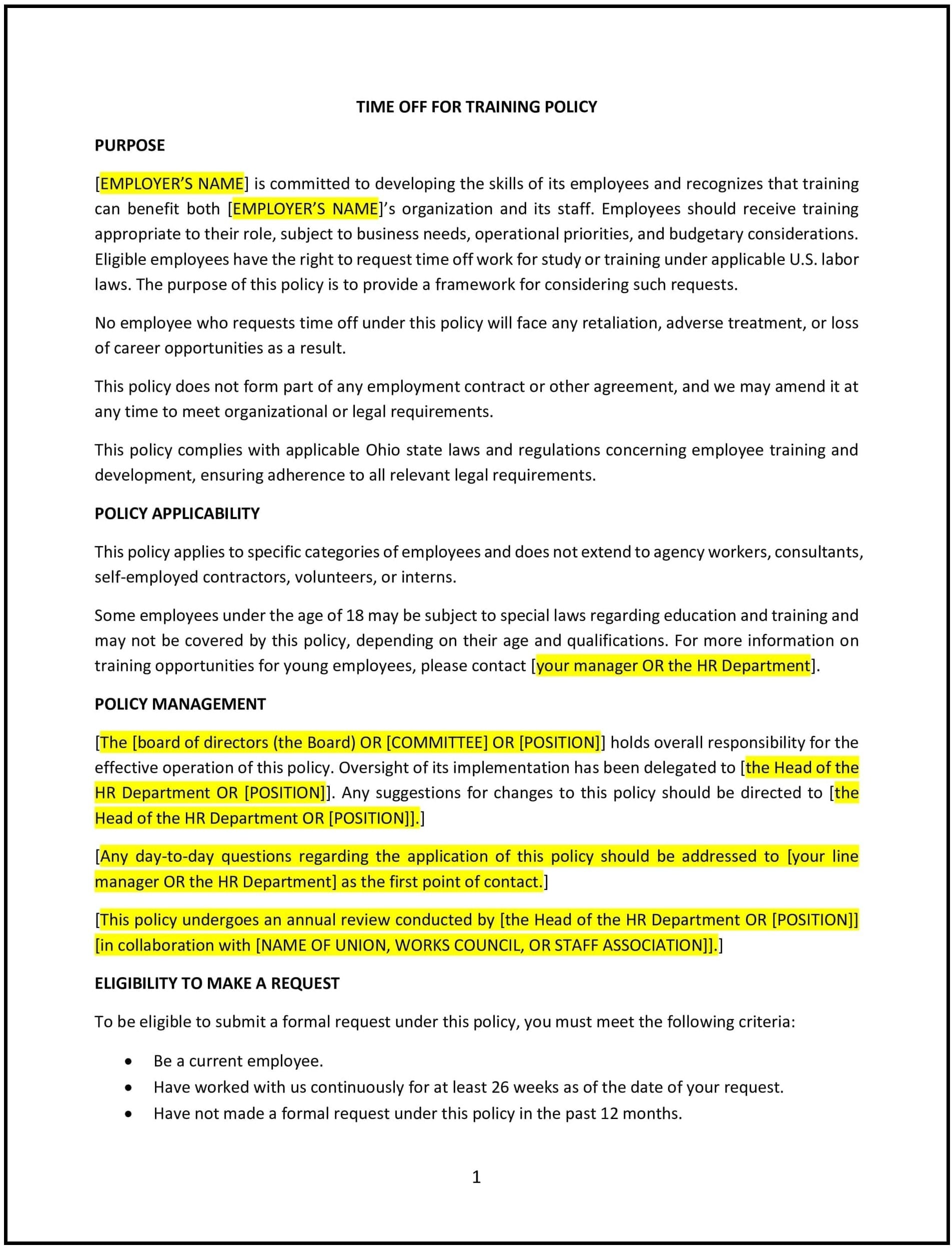Got contracts to review? While you're here for policies, let Cobrief make contract review effortless—start your free review now.

Customize this template for free
Time off for training policy (Ohio)
A time off for training policy outlines the procedures for providing employees in Ohio with time off to attend training programs, workshops, seminars, or other educational activities that improve their skills and benefit the business. This policy clarifies the process for requesting time off, the types of training covered, and any conditions related to time off, such as whether the training is paid or unpaid leave. It ensures that employees have the opportunity to develop professionally while minimizing disruptions to business operations.
By implementing this policy, Ohio businesses can promote ongoing employee development, support career growth, and improve overall workforce skills and productivity.
How to use this time off for training policy (Ohio)
- Define eligible training activities: The policy should specify which types of training qualify for time off, such as job-related courses, certifications, professional development workshops, or industry-specific conferences. It should clarify whether personal development activities or unrelated training are eligible for time off.
- Outline the request process: The policy should explain how employees can request time off for training, including any notice period required, the documentation needed (such as proof of registration or a course schedule), and the person or department to contact for approval.
- Set guidelines for paid or unpaid leave: The policy should clarify whether employees will receive paid leave for training or if the leave is unpaid. It may provide different terms based on the type of training or the length of the course.
- Specify time off duration: The policy should outline the maximum amount of time off employees can take for training, including whether the leave is for a one-day course, a multi-day seminar, or a long-term program. It should also address how time off for training affects paid time off (PTO) or vacation days.
- Require employee performance improvements: The policy should specify that the training must be relevant to the employee’s current role or career development and aligned with business needs. It may also clarify that the business expects employees to apply the knowledge gained from training to their work.
- Address the impact on work operations: The policy should discuss how employees’ responsibilities will be managed during their time off for training, such as through temporary coverage or adjusting schedules.
- Review and update regularly: The policy should be reviewed periodically to ensure it remains in line with Ohio state laws, federal regulations, and the evolving needs of the business and workforce.
Benefits of using this time off for training policy (Ohio)
This policy provides several key benefits for Ohio businesses:
- Enhances employee skills: By offering time off for training, businesses help employees acquire new skills, certifications, and knowledge, which can increase productivity, efficiency, and overall work performance.
- Promotes professional development: Providing training opportunities supports employees' career growth, which can lead to greater job satisfaction, loyalty, and retention.
- Strengthens the workforce: A more skilled workforce is better equipped to handle the challenges of the business, improve quality, and drive innovation.
- Improves business competitiveness: Well-trained employees contribute to the business’s competitiveness by staying up-to-date with industry trends, best practices, and regulatory changes.
- Supports employee engagement: Offering training opportunities shows that the business values its employees and invests in their professional development, leading to greater engagement and morale.
- Complies with legal and regulatory requirements: The policy ensures that employees are provided with training opportunities necessary for compliance with industry regulations or safety standards, if applicable.
- Increases retention: Employees who have access to professional development opportunities are more likely to stay with the company, reducing turnover and recruitment costs.
Tips for using this time off for training policy (Ohio)
- Communicate the policy clearly: Ensure that all employees are aware of the time off for training policy by including it in the employee handbook, discussing it during onboarding, and providing periodic reminders about how to request time off for training.
- Approve training requests promptly: Managers should review and approve training requests in a timely manner, taking into account the needs of the employee and the business. Provide feedback on how the training will benefit both the employee and the organization.
- Encourage relevant training: Encourage employees to select training programs that are directly relevant to their current roles or future career development within the company. This ensures that the training is beneficial to both the employee and the business.
- Provide support for logistics: Ensure that employees have the necessary resources and support to attend training, including adjustments to their schedules, travel arrangements, or coverage for their duties while they are away.
- Review training effectiveness: Periodically evaluate the effectiveness of training programs by assessing whether employees apply what they've learned to their work and whether the training aligns with business objectives.
- Monitor training leave: Track time off taken for training to ensure that it aligns with the company’s policies and does not lead to excessive leave. Review how time off affects staffing and operations and adjust accordingly.